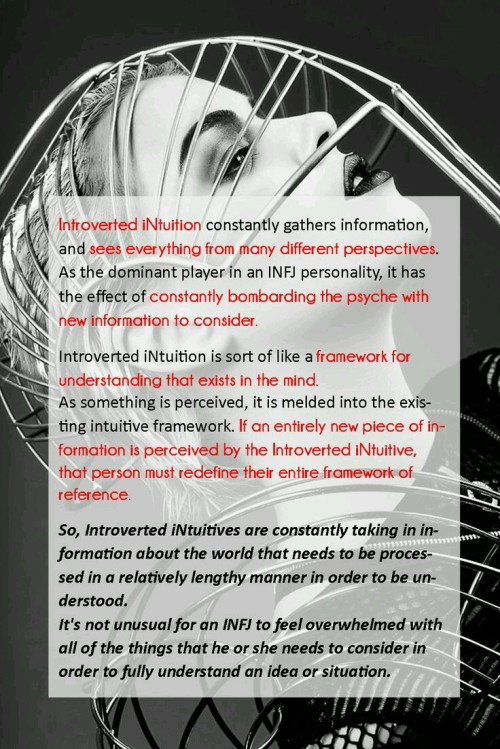#introverted intuition
INFJ - Introverted intuition is sort of like a framework in the mind for understanding what exists. It sees everything from many different perspectives and constantly is bombarding the psyche with new information to consider. If an entirely new piece of information is perceived by the introverted intuitive, that person must refine their entire framework of reference.
Post link
Manipulators seek to dominate and control your decision making, see Manipulative Behavior for more detail. Some common examples of manipulative tactics:
Si: throws past issues/mistakes at you
Ni: uses knowledge of you against you
Ti: gradually chips at your self-esteem
Fi: twists your sense of loyalty or morality
Se: evades, distracts, makes excuses
Ne: empty promises, tries to confuse you
Te: shuts down discussion/disagreement
Fe: exploits your emotional vulnerabilities

Mr. Green: Extraverted Intuition (Ne)
(According to the “real” ending, Mr. Green is not who he pretends to be, but let’s go with the character he’s acting as for the majority of the story.)
Mr. Green is nervous and chatty and prone to random conceptual leaps—“Mrs. Peacock was a man?!” He’s had to live his whole life under a pretense, acting out a part that everyone wants to see. He’s the one chosen to distract the cop, making up idle conversation while the others hide the bodies. He connects the dots during dinner conversation that all of them work in the government, and wonders what it could mean. In the real ending, he’s first to arrive at the conclusion that Wadsworth is really Mr. Boddy. He slaps Mrs. Peacock because it seems like a good idea at the time, and he’s kind of awkward in his own body, often falling prey to clumsiness.
Best Suggestion: ENFP

Wadsworth: Introverted Intuition (Ni)
Wadsworth has one goal for the evening—to dispense with his accomplices and tighten the noose on his blackmail victims. For this he invents a whole evening of shadowplay, a complex plan to push his dinner guests toward murder. He assigns each of them colorful names, possibly related to how he visualizes their individual personalities in his imagination. Or maybe as if he’s picturing them as pawns on a gameboard. Though he’s confident of his plot, he can become just as panicked as anyone else when the environment changes too quickly—when the lights go out, he mistakes a shower faucet for a doorknob. He walks, or rather runs, the company through the night’s events, appearing to have solved the crime when actually he already predicted what everyone would do. For all his foresight, he fails to react in the moment when Mr. Green gets the drop on him and ends his crime spree.
Best Suggestion: INFJ
(Not really sure that Wadsworth is actually an Ni-user, but I think this paints a decent portrait of the cognitive function as if he were.)

ENFJ – the Giver, the Mentor, the Believer
I’ve no idea if it says anything about the franchise that the biggest nemeses in two different Star Treks are ENFJs. Even TNG had Lore, the ENFJ cult leader. Seems like Star Trek may have a running theme about the dangers of following crazed, charismatic leaders with big but empty promises.
(P.S. I feel really gross using my cheesy terms like “Believer” and “The Garden Fountain” for someone like Dukat, but that’s the format.)
Dominant Function: (Fe) Extraverted Feeling, “The Garden Fountain”

Gul Dukat needs to be loved. We all do, of course. Dukat, however, lives and breathes off the adoration, honor, praise, and hero-worship of others—which he never gets.
Back when he was made Prefect of Bajor during the Occupation, Dukat believed a gentler approach was needed. He enacted policies to ease the burden on labor camp workers, but strangely, the Bajorans failed to show appreciation for his compassion. They seemed to dislike being occupied by an invading force no matter how nice he was about it. They continued to resist him, and Dukat felt compelled to strike back and punish their ingratitude.
This cycle describes much of Dukat’s life and career. He wants to lead, but when his subjects or fellow leaders don’t like him, he struggles. He either overcompensates and looks desperate, or lashes out and becomes the angry tyrant he claims not to be.
Dukat is ready to kill Ziyal, his secret half-Bajoran daughter with a Bajoran woman, to preserve his reputation in the Union. He makes a hard choice to keep her alive and accept the disgrace, and then spends the rest of her short life trying to make sure she knows him as a good man. She falls for it (largely, I believe, because she is an ENFJ as well, as least in her final incarnation), and when she’s killed, Dukat loses the last attachment he had to any kind of innocence.
Nevertheless, Dukat is a skilled orator who can see which way the political wind is blowing and talk his way into positions of influence and power. He works his way up from disgrace as the Prefect of Bajor, then again after the reveal of Ziyal, this time masterminding Cardassia’s alliance with the Dominion. He gives fantastically inspiring speeches to the Cardassian people, promising a return to greatness and a purifying of the Union from the presence of its enemies.
And when that role fails him, he appoints himself leader of a cult of gullible Bajorans in the ways of the Pah-wraiths. His final con finds him seducing the Kai herself into believing he’s a simple Bajoran farmer, leading her down his dark path with flattery and appeals to her ego. The two Fe-doms decide that Bajor is worthy of neither of them, and must be destroyed.
Dukat gets exactly nowhere trying to seduce the two Fi-dom leaders of DS9. He makes continued creepy advances on Kira, hoping to win her heart, but she resists (especially when he reveals that he had a relationship with her mother, which makes him more attracted to her and her more disgusted by him). He straight up kidnaps a wounded Captain Sisko and pretends to care for him on a deserted planet, hoping that Sisko will finally see how wonderful a person he is; but Sisko isn’t having it, ultimately deciding that there is nothing redeemable at all about the man.
Auxiliary Function: (Ni) Introverted Intuition, “The Labyrinth”

Dukat survives despite repeated failure thanks to his ability to see a way forward in any situation. No matter how far he falls, Dukat has a vision to climb back to power—crusading against rogue Klingons in order to avenge the honor of Cardassia, or allying the Union with the Dominion, which temporarily makes him the leader of one of the greatest powers in the Quadrant. He believes in the superiority of the Cardassian people, and their sovereign right to rule the galaxy, which justifies any decision he makes that causes harm or distress to inferior races like the Bajorans.
He’s completely deluded about his own importance, idealizing all his actions into a mythology of a great man unappreciated in his time. Any criticism that cuts at that vision makes him defensive and angry. While his foresight can sometimes make him a canny political strategist, his overconfidence can also blind him to his enemy’s moves—for instance, when he’s stranded on DS9 by a security program left there by his superiors, who distrusted his loyalty.
Dukat’s final ploy involves following the path of the Pah-wraiths, the devils of Bajoran religion, in an ultimate grab for cosmic power.
Tertiary Function: (Se) Extraverted Intuition, “The Kitchens”

Dukat’s Se sometimes leads to him running through aggressive loop behavior, enacting more extreme measures and harsh punishments to gain control of his image. He can make ruthless decisions in the moment, and fight his way out of a corner. Despite being a devoted husband and father, he enjoys the company of Bajoran comfort women, which leads to his affair with Kira’s mother and his illegitimate daughter. He’s wily and quick, and survives no less than five assassination attempts during his tenure as Prefect of Bajor.
Inferior Function: (Ti) Introverted Thinking, “The Laboratory”

Like all Cardassians, Dukat was raised with strict mental discipline, and can even resist the intrusion of a Vulcan mind meld. That said, he lacks the ability to examine his obsessions critically, and melts down rather quickly when robbed of his goals. After Ziyal is killed, he loses his mind and can no longer function as anything but a purely emotional, rage-driven creature.
His biggest personal breakthrough is to realize at last that the Bajoran people will never love him. He decides they are weak, inferior creatures who don’t deserve his love. It’s their fault—and Sisko’s, and Kira’s, and everyone else’s—for not understanding him.
Dukat enacts a plan to wipe out Bajor, eventually ending up defeated by Sisko and knocked into some sort of cosmic hellscape, where he no doubt spends eternity blaming everyone in the galaxy for his failures.

INFJ – the Counselor, the Seer, the Defender
Wait, haven’t we seen this guy before? No, it’s not because Weyoun is a clone, it’s because Jeffrey Combs played another DS9 villain, Brunt. They even appeared in the same episode once, though sadly, not in the same scene.
Two Weyouns once appeared in the same episode, too, because the character we know as Weyoun is actually a series of clones (Weyouns 4-8 during the run of DS9, to be specific). However, because he’s genetically engineered to do his job perfectly, he always has the same personality, even when he turns out “defective.” In MBTI, your type is generally a function of nature rather than nurture—you are wired the way you’re wired no matter what, though personal experience will influence how your functions manifest. In Weyoun’s case, his “nature” is embedded in his DNA by those who “nurture” him, the Founders he reveres as gods.
Dominant Function: (Ni) Introverted Intuition, “The Labyrinth”

Weyoun believes in the mythos of the Dominion—that the Founders are gods who bring order to the galaxy. He believes that the Dominion will endure for thousands of years after the Federation is gone, and works to advance their holdings and influence with every move he makes. He believes that his goals are divinely inspired by the Founders, perfect and not to be questioned.
Even the defective Weyoun 6 still holds the Founders in awe and reverence, even though he awakens from the cloning process with the inexplicable idea that the Dominion’s war efforts are wrong.
Weyoun always works with a hidden agenda, a far-sighted goal for the Dominion’s gain—Bashir’s genetically engineered friends can tell that he’s thinking big picture, years or centuries ahead. He arranges peace-talks with the Federation over a new proposed border, playing nice and taking an apparently disadvantageous deal when actually it will give the Dominion access to a planet with a fungus helpful to their Ketracel-white production. He and Sisko make small talk about the minefield Starfleet has put up in front of the wormhole, but both Intuitives know that the real meaning of the conversation is that they’re about to go to war.
Weyoun sizes people up quickly, searching for the clue that will give him the advantage over his diplomatic targets. Damar accuses the whole Weyoun line of having an innate flaw of overconfidence, never doubting the success of their vision. The final Weyoun understands immediately when Damar’s rebellion destroys a cloning facility, that Damar’s true goal is to keep any more Weyouns from being made.
(Although do we seriously believe Weyoun doesn’t have more copies of himself squirreled away somewhere? Please.)
Auxiliary Function: (Fe) Extraverted Feeling, “The Garden Fountain”

The Dominion’s aim is to conquer and subdue all worlds in the galaxy, but Weyoun makes it sound like a wonderful club that you’d be silly not to join.
Weyoun speaks with grace and eloquence, aiming for compromise and mutually beneficial agreements (in fact, his negotiating tactics have a lot in common with those of Quark, an ESFJ). He’s politically adept, and genuinely tries to have good working relationships even with those he disagrees with. In diplomatic discussions, he can play wounded as well as confident, keeping his adversaries off balance so he can emotionally ply them to get what he wants.
Weyoun orchestrates the alliance with the Breen, treating them like old friends as soon as the deal is made. This infuriates Damar, who Weyoun snubs in order to keep him in his place. When the Cardassians start rebelling, Weyoun gives grand speeches about the spirit of cooperation. He feigns sadness that he has to order mass executions in order to ensure obedience, gaslighting the people into believing their deaths are their own fault.
The “defective” Weyoun 6 still wants the Dominion to succeed, but he also wants peace for all people. He can’t completely betray the Founders, and so he defects to Odo, the only Founder on the opposite side of the war, hoping to start a process that will convince the other Founders to change the Dominion’s course. He fails, but still desires Odo’s favor and blessing before he dies.
Weyoun’s emotionally manipulative tactics do have consequences.
Weyoun 5 dies in a mysterious transporter accident, possibly arranged after Damar got sick of his arrogance. Weyoun 7 gets himself killed after prodding Ezri about her feelings for Bashir, thus enraging Worf, who snaps his neck. Weyoun 8 gets himself killed after mocking Damar’s rebellion, and the destruction of the planet, prompting Garak to shoot him.
He dies in service to his Founder, loyal to the end.
(But again, there are more of him, right?)
Tertiary Function: (Ti) Introverted Thinking, “The Laboratory”

Weyoun can be cold and direct when he needs to be, as when he demands the removal of the minefield. He quickly segues into flattering persuasion mode afterward, of course. He delivers sharp insults when necessary as well, never afraid to call out Dukat’s tiresome egotism or Damar’s stupidity. He incisively interrogates the intruding Jake and Nog, assuming they’re conspiring against him, but when they lead him to Dr. Giger’s immortality machine, he’s intrigued by the mad scientist’s ideas.
Auxiliary Function: (Se) Extraverted Sensing, “The Kitchens”

The Founders did not see fit to create the Vorta with a sense of aesthetics. With his weak eyes, Weyoun can’t appreciate art, though he does try. He examines Ziyal’s paintings and asks Kira if they’re “good.” She’s not helpful, and Weyoun decides if the Founders had needed him to enjoy art to do his job, they’d have programmed him with the ability.
Weyoun 6, however, decides to indulge when he defects. Freed from the constraints of his duty, he goes a little crazy trying all kinds of new foods from the replicator. He takes particular delight in pepperoni pizza. The normal Weyoun disdains his working partner Damar for his obvious drunkenness, while at the same time appearing to have a secret hope of watching the captive Worf and Ezri “comfort each other.”
No wonder Worf snapped his neck.
Fortunately, there’s another Weyoun waiting to take his place, because the universe can’t get rid of him that easily (I believe in Weyoun 9, is what I’m saying).
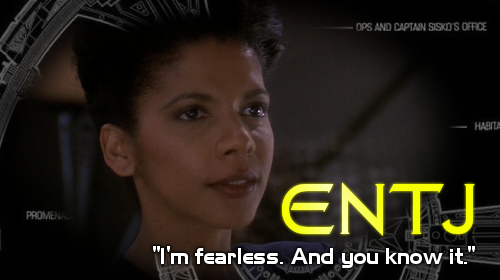
ENTJ – the Commander, the Field-Marshall, the Trailblazer
With the introduction of Kasidy Yates, yet another Extraverted Judger type entered Ben Sisko’s Fi-dom life, challenging his comfort zone. Kasidy and Ben are my favorite couple in all of Star Trek, and it’s frankly impressive and encouraging that these two disparate personality types make such a great pair. They confound each other at every turn, and yet every scene they play together strikes sparks. They seem to enjoy the mystery that is the person they love.
Dominant Function: (Te) Extraverted Thinking, “The Workshop”
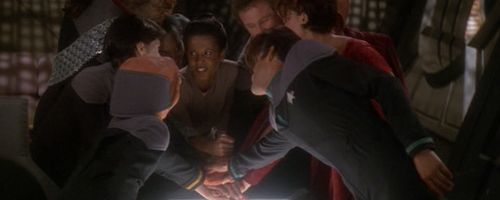
Kasidy is captain of her own ship, the Xhosa, which she runs under the company she founded—Kasidy Yates Interstellar Freights, the rhymingest name for a business in all of Star Trek. Since humans live without money in this future, one must assume she’s doing the job for the joy of the work, or that she turns a profit on the side for use outside the Federation’s moneyless economy. Either way, she gets up at 5am every day, and often works till 1am.
She lives by her father’s motto: “If you’re going to do something, do it right.” This even applies to jobs she’s not that interested in, but feels a duty to complete, like her work as convoy liaison officer for one of the Defiant’s escort missions. She gets the job due to her work record and her high standing among the other freighter captains.
Kasidy is willing to take charge in critical situations. She smuggles supplies to the impoverished Maquis, and when she’s caught, she takes responsibility and lets her crew go, facing the consequences on her own. When Ben gets too worked up over the Niners’ baseball game, she pulls the team together and gets them into fighting shape.
She’s skeptical of the whole “Emissary” thing, and all of Ben’s talk about his destiny. When they decide to marry, she doesn’t want to have a gigantic, ridiculous wedding ceremony just to make the Bajoran people happy (though she’s an Extravert, she’s an Extraverted Thinker, and large social occasions based on nothing but group feelings can drain Te-doms as much as any Introvert). She always tries to get her Fi-dom boyfriend/fiancé to speak his mind to her, especially when he just wants to brood.
Auxiliary Function: (Ni) Introverted Intuition, “The Labyrinth”
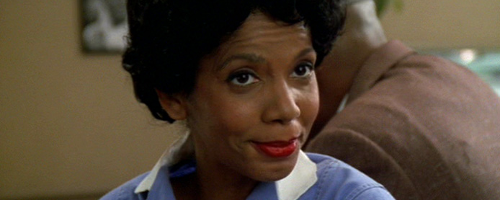
Kasidy is career-focused, and will take an opportunity from the Bajorans even if Ben isn’t sure yet about the arrangement. While Ben doesn’t like the historic inaccuracies of Vic’s, Kasidy encourages him to see the re-creation as the way things should have been, rather than the way things actually were—personally, it inspires her to remember that she is no longer bound by limitations. Even the 50s fantasy version of Kasidy is focused on achieving a better life for herself and Ben.
Kasidy senses there’s something more to Ben’s mission to beat the Vulcan captain at baseball, and eventually digs the secret out of him. She then reveals the vendetta to the rest of the crew, because she knows it will inspire them to train harder. She loves Ben’s dreams of a future life together in a home on Bajor, and jokes about the crusty old man she sees him turning into. When Ben ends up vanishing with the Prophets, she holds on to the hope that he will return one day.
Tertiary Function: (Se) Extraverted Sensing, “The Kitchens”
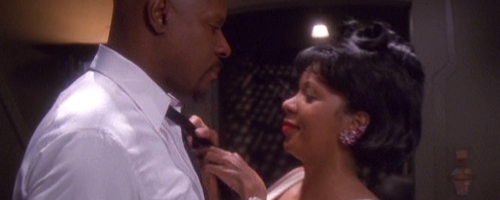
Kasidy is quick to take action on what she wants and the opportunities she’s given—in just a day or two, she goes from accepting a new job to moving into her own quarters on the station. She could have gone into a career in Starfleet, but she doesn’t love the minutae of paperwork. She enjoys the campy fun of Vic’s lounge, throwing herself into the role of flirty gambler when the crew pulls off a heist, and she and Ben first bond over their love of the sport of baseball. She decides on the spur of the moment to try cooking for Ben to cheer him up, but ends up burning his homegrown peppers (he forgives her, but keeps her out of the kitchen from then on).
When Ben worries that her ship will be heading through Jem’Hadar territory, she says they’ll have to catch her first.
Inferior Function: (Fi) Introverted Feeling, “The Deep Well”
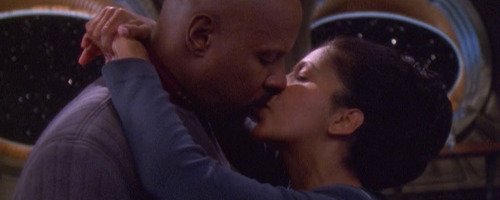
Kasidy and Ben sometimes miss each other on emotional communication, but they do try. He’s an Fi-dom who keeps things to himself unless pressed, and she’s an Fi-inferior who has to apply effort to work through any situation involving feelings. When she briefly joins the Defiant on a mission, she knows Ben is uncomfortable with her presence, but she can’t get him to admit it.
Kasidy won’t turn down the job offer from the Bajorans just because it upsets Ben. And once he apologizes, she makes him wait to kiss her again. She leaves him when he changes his mind about their marriage based on the Prophets’ influence, and only comes back once she makes him promise that he means it this time. She doesn’t relate to Ben’s moral objections to Vic’s, but tries to sympathize with his position. She’s unapologetic about her activities with the Maquis—it’s a personal conviction that she sticks by.
She certainly doesn’t blame Ben for what he has to do as a result of her smuggling. She understands the concepts of responsibility and duty, and so does he. Once she returns from her brief stint in prison, their relationship continues virtually unchanged—they have a romantic bond that neither can let go of, even when separated by different planes of existence.

